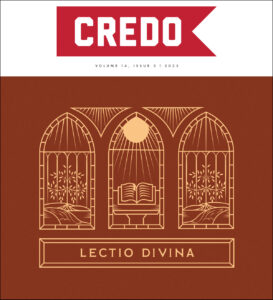
Principles for the Practice of Lectio Divina
M uch can be learned about meditation by paying close attention to what the Bible itself has to say on the subject. The Latin terms meditari and meditatio translate the Hebrew word hagah, “to contemplate, to talk, to mumble.” Hagah refers not merely to a mental process, but also to an audible phenomenon—a murmuring or muttering of words under one’s breath or sotto voce. In one biblical text the Hebrew word refers to the cooing of a dove (Isa. 38:14). This is not of course the usual mental image of a meditating monk, kneeling in a chapel in absolute silence. One notices too that the biblical instruction given to Joshua implies a spoken and audible word: “This book of the law shall not depart out of your mouth; you shall meditate on it day and night, so that you may be careful to act in accordance with all that is written in it. The command to “eat this scroll” indicates that God’s word must be consumed and digested to yield its full effect and benefit. Click To TweetFor then you shall make your way prosperous, and then you shall be successful” (Josh. 1:8). The text does not say that the book should not depart from Joshua’s “mind,” but not from his “mouth.” In other words, Joshua was constantly to be speaking God’s word aloud to himself or to others.
uch can be learned about meditation by paying close attention to what the Bible itself has to say on the subject. The Latin terms meditari and meditatio translate the Hebrew word hagah, “to contemplate, to talk, to mumble.” Hagah refers not merely to a mental process, but also to an audible phenomenon—a murmuring or muttering of words under one’s breath or sotto voce. In one biblical text the Hebrew word refers to the cooing of a dove (Isa. 38:14). This is not of course the usual mental image of a meditating monk, kneeling in a chapel in absolute silence. One notices too that the biblical instruction given to Joshua implies a spoken and audible word: “This book of the law shall not depart out of your mouth; you shall meditate on it day and night, so that you may be careful to act in accordance with all that is written in it. The command to “eat this scroll” indicates that God’s word must be consumed and digested to yield its full effect and benefit. Click To TweetFor then you shall make your way prosperous, and then you shall be successful” (Josh. 1:8). The text does not say that the book should not depart from Joshua’s “mind,” but not from his “mouth.” In other words, Joshua was constantly to be speaking God’s word aloud to himself or to others.
The book of Deuteronomy gave such instruction not only to Israel’s leader, but to the whole nation, who were to “recite them [i.e., the biblical words] to your children and talk about them when you are at home and when you are away, when you lie down and when you rise” (Deut. 6:7). The Israelites were to be gossiping the good news of God wherever they went and during their daily chores. The “meditation” on God’s written word in Psalm 1 and other texts thus denotes “the half-audible murmur of a person who is praying.”[1] Such meditative recitation was multidimensional. It involved not only seeing written words on a page, but also the speaking of those words, and the hearing of the words thus spoken. It involved a thinking mind, a feeling heart, a speaking mouth, and a listening ear. No wonder that the written scroll of God’s word is presented in Scripture to the prophet as something to chew and swallow (Ezek. 3:1–4; Rev. 10:8–11). The command to “eat this scroll” indicates that God’s word must be consumed and digested to yield its full effect and benefit.

